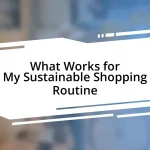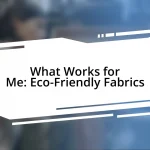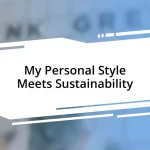Key takeaways:
- Ethical footwear brands prioritize sustainable materials and fair labor practices, enhancing consumer awareness about production origins.
- Choosing ethical footwear supports environmental sustainability, fair labor, and promotes healthier choices, while offering unique and durable designs.
- Key materials in ethical footwear include organic cotton, hemp, and recycled materials, each contributing to environmentally friendly practices.
- Researching brand values, considering product lifecycle, and supporting local artisans are crucial steps in selecting ethical footwear.

Understanding Ethical Footwear Brands
When I first learned about ethical footwear brands, I was surprised by the variety of choices available. It’s not just about style; these companies prioritize sustainable materials and ethical labor practices. Have you ever thought about where your shoes come from and who made them? It’s a real eye-opener.
Some brands use recycled materials and natural fibers instead of harmful synthetics, which is something I find incredibly inspiring. I remember purchasing a pair of shoes made from recycled plastic bottles—it felt like I was making a positive impact with my fashion choices. Isn’t it amazing how a single purchase can contribute to environmental sustainability?
Moreover, these brands often focus on fair wages and safe working conditions for their employees, fostering a sense of community and respect. When I discovered that my favorite pair of sneakers was made by workers in a supportive, fair environment, I felt a connection to the people behind the product. Doesn’t knowing the story behind your shoes make wearing them even more special?
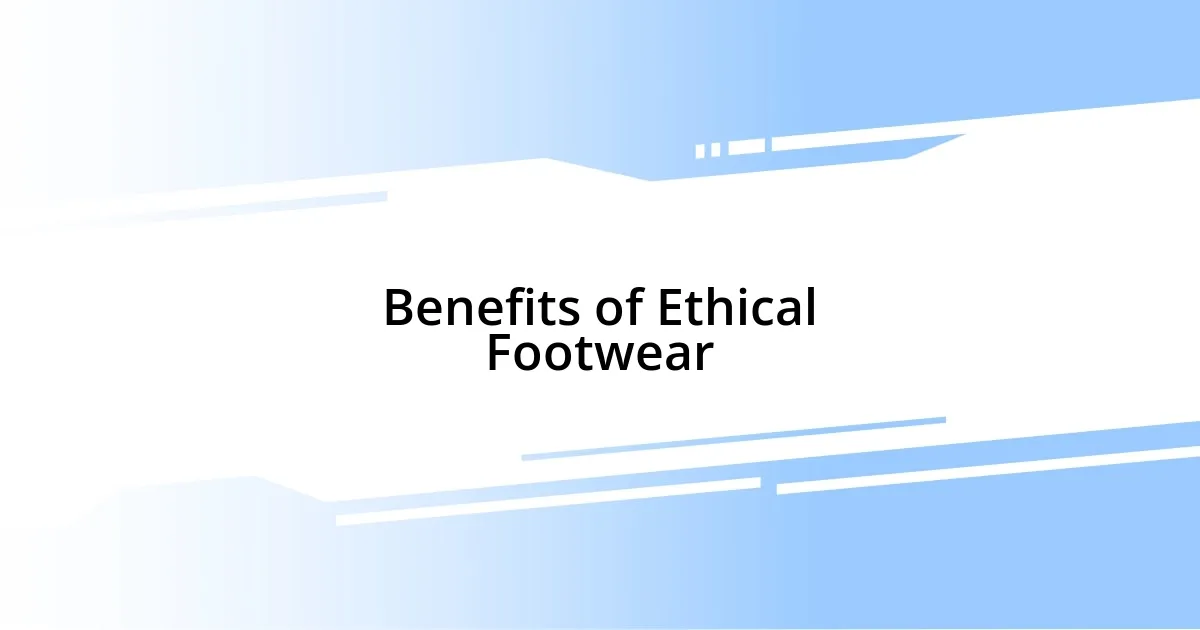
Benefits of Ethical Footwear
Choosing ethical footwear has numerous benefits that extend far beyond mere aesthetics. Personally, I’ve experienced a profound sense of pride when I wear shoes made from sustainable materials. It’s as if each step I take is a testament to the choices I’ve made, promoting a cleaner planet and a better industry.
Here are some of the notable benefits of ethical footwear:
– Environmental Impact: Ethical shoes often use sustainable materials, reducing waste and energy consumption.
– Support for Fair Labor Practices: By choosing these brands, you’re supporting workers who are paid fair wages and work in safe conditions.
– Healthier Choices: Many ethical shoes are made without toxic chemicals, benefiting both the environment and your health.
– Unique Style: Ethical brands often offer distinctive designs, so you’ll stand out while making a difference.
– Long-lasting Quality: Many of these shoes are crafted with durability in mind, meaning they last longer than fast fashion options.
I vividly remember the moment I slipped on my first pair of ethically sourced sandals. They felt not just comfortable, but also like a small revolution each time I wore them. It’s fulfilling to support a cause that resonates so deeply, knowing I’m part of something greater with every step I take.
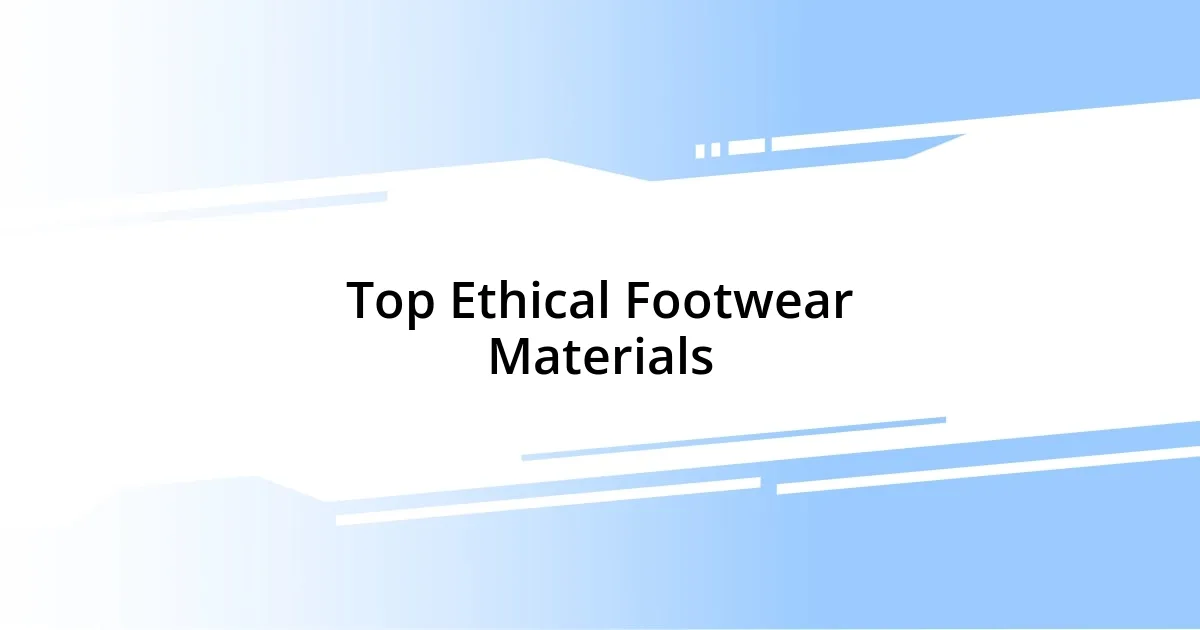
Top Ethical Footwear Materials
When I first dove into the world of sustainable footwear, I quickly learned how materials impact not just the shoes, but also the planet. Take organic cotton, for example; it’s soft, breathable, and grown without harmful pesticides. I remember slipping into a pair of organic cotton slip-ons and feeling a wave of comfort wash over me, knowing they were produced without contributing to chemical pollution. The thought of wearing something that’s kind to the Earth? Priceless.
Another material that deserves a shout-out is hemp. This extraordinary fiber is not only durable but also requires significantly less water to grow compared to conventional materials like cotton. I recall trying on a pair of hemp sneakers and being surprised by their lightweight, yet sturdy feel. It’s like walking on clouds while supporting an eco-friendly crop. Have you experienced something similar with hemp footwear?
Lastly, I can’t overlook the importance of recycled materials. Whether it’s shoes made from repurposed plastic or old rubber tires, these innovations are transforming waste into stylish footwear. I remember purchasing shoes created entirely from recycled ocean plastics; every step felt meaningful. This blend of creativity and sustainability reflects a growing movement that inspires me daily. With so many remarkable materials to choose from, making ethical fashion decisions has never been easier.
| Material | Key Features |
|---|---|
| Organic Cotton | Soft, breathable, grown without pesticides |
| Hemp | Durable, requires less water, lightweight feel |
| Recycled Materials | Transformed from waste, eco-friendly innovation |

Popular Ethical Footwear Brands
I’ve come across several ethical footwear brands that truly resonate with my values. For instance, Allbirds has quickly become one of my favorites. Their commitment to sustainability is evident in each pair of shoes, crafted from materials like merino wool and eucalyptus tree fiber. I remember how light and breezy my first pair felt, especially on a long walk; they’re not just shoes, they’re a reminder that comfort can coexist with eco-consciousness.
Another brand I admire is Veja. Their unique approach to producing sneakers using organic cotton and wild rubber from the Amazon caught my attention. I wasn’t expecting them to look so stylish while being planet-friendly. I distinctly recall wearing my Veja shoes to a casual gathering, and I got compliments on their design—who knew ethical choices could also turn heads? Have you found a brand that surprised you like that?
Lastly, I can’t ignore the charm of Toms. Their one-for-one model, where every pair purchased funds shoes for someone in need, speaks to my heart. The first time I slipped into a pair, I felt like I was walking for a cause. It’s amazing to think that with each step I take, I’m contributing to a bigger picture. Have you ever worn something that made you feel part of a larger movement? That sense of connection is what drives me to seek out ethical footwear again and again.
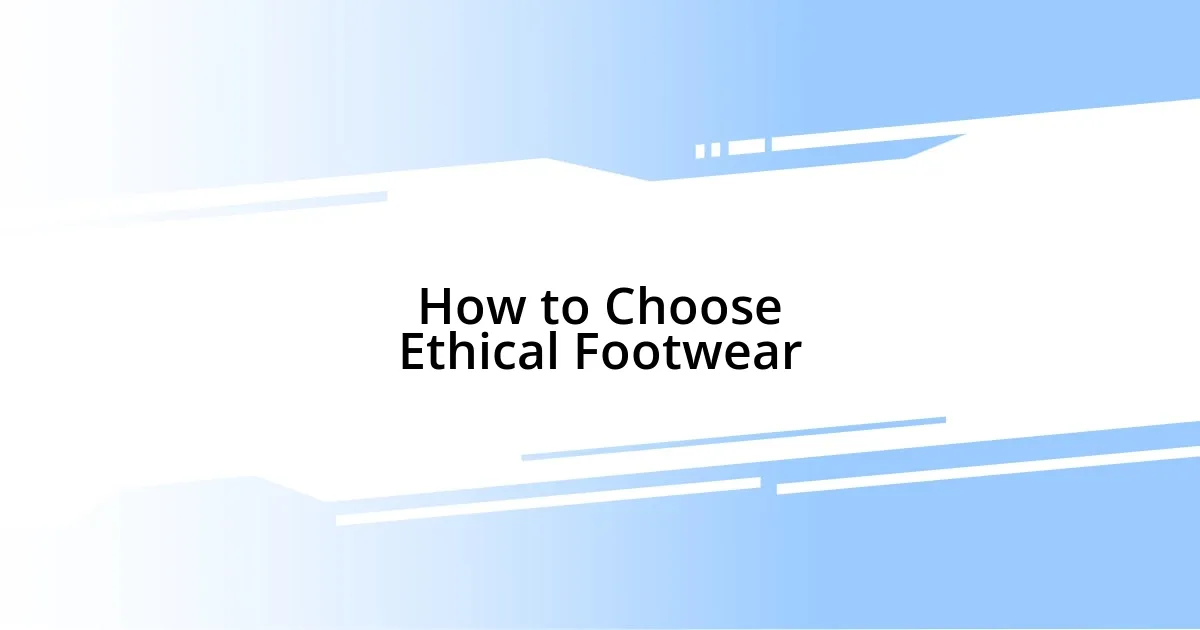
How to Choose Ethical Footwear
When selecting ethical footwear, it’s crucial to research the brand’s values and practices. I remember being drawn to a company’s story about their fair labor practices and how they support artisans. It made my decision so much easier, knowing my shoes were made by people who were treated well. Have you ever researched a brand and felt that connection to the craft behind your purchase?
Next, consider the lifecycle of the footwear. Are the shoes designed to last, or are they meant to be disposable? I once bought a pair made with durable materials, and years later, they’re still a staple in my wardrobe. It’s heartbreaking to see so many people unaware of the environmental impact of throwaway fashion. What if we all shifted our mindset to invest in quality rather than quantity?
Lastly, don’t overlook local brands and artisans. Supporting businesses in your community can amplify the positive impact of your purchase. I still recall visiting a local fair where I found a pair of shoes handmade from reclaimed leather. Knowing they had a unique backstory added a real charm to my wardrobe. What unique finds have you discovered in your own neighborhood?
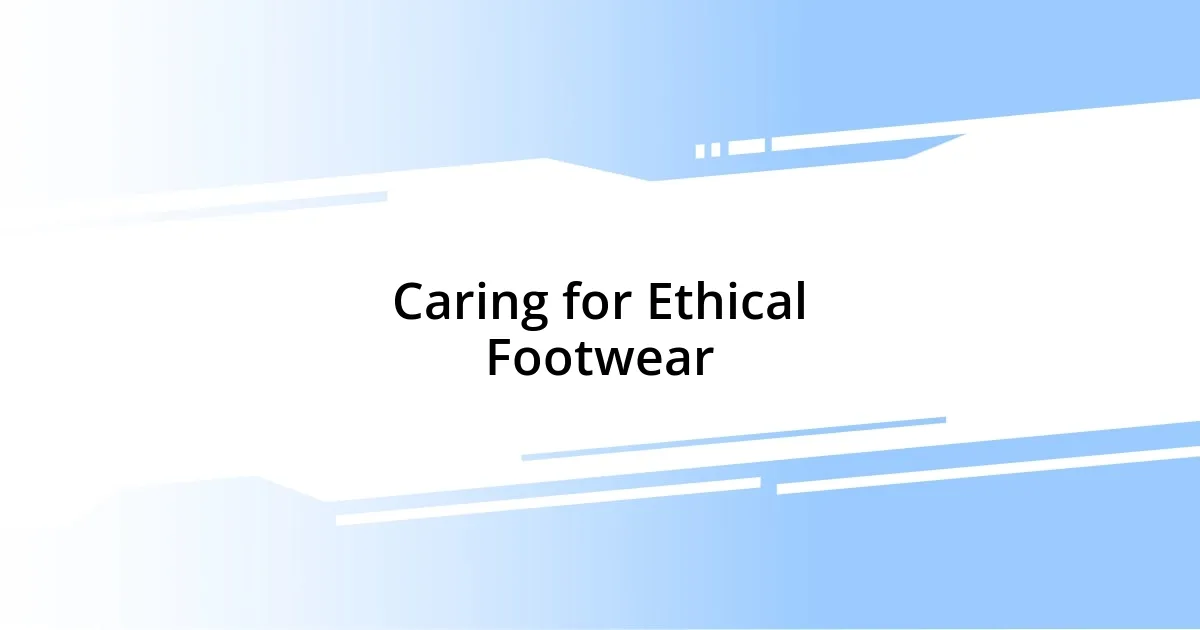
Caring for Ethical Footwear
Caring for ethical footwear requires a bit of love and attention, just like any valuable piece in your wardrobe. I’ve always made it a point to clean my shoes with eco-friendly products, ensuring that I maintain their quality without harmful chemicals. After all, why should caring for our planet come at the price of damaging our shoes? Remember when you last treated your footwear? A little upkeep can go a long way.
Moreover, storing your ethical shoes properly can significantly extend their lifespan. I’ve learned that keeping them in a cool, dry place helps prevent unwanted wear and tear. When I first started taking care of my shoes this way, I was amazed at how much longer they lasted. Have you ever noticed how a little care can revive a favorite pair? You simply appreciate them more when you see them shining fresh.
For me, repair is a vital part of caring for my ethical footwear. Instead of tossing a pair simply because they’ve developed a scuff, I’ve sought out cobblers who share my values about sustainability. I recall giving new life to a beloved pair of sandals; it felt rewarding to know I was extending their journey rather than contributing to waste. How do you handle repairs? Each time we opt for mending, we’re not just saving money—we’re honoring the craftsmanship behind those shoes.
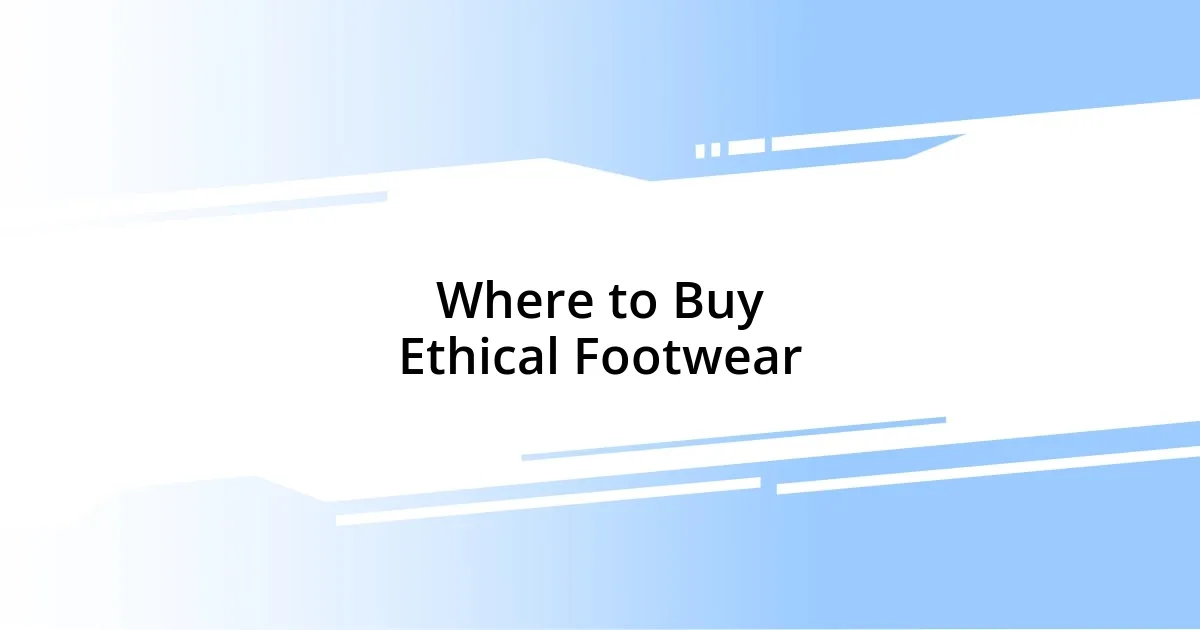
Where to Buy Ethical Footwear
Finding ethical footwear can be both exciting and fulfilling, especially with a growing number of brands committed to sustainability. I often turn to online marketplaces that specialize in eco-friendly products. Just last month, I discovered a brand that focuses on vegan materials; their shoes felt great, and I loved knowing they were kind to animals. Have you ever found a treasure online that you just couldn’t wait to show off?
Local boutiques are another fantastic option for purchasing ethical footwear. I still remember walking into a cozy shop downtown, eager to explore. That’s where I found a pair of shoes crafted from upcycled materials. It brought me such joy to support artisans in my community while also scoring a unique piece. Have you checked out any local shops that resonate with your values?
You might also consider secondhand options as a way to find ethical footwear. Whether it’s at thrift stores or on apps dedicated to pre-loved items, there are great gems waiting to be discovered. I recently picked up a barely-used pair of boots that felt like they were meant for me. Plus, buying secondhand not only reduces waste but also fuels a more circular economy. How many amazing finds have you scored while thrifting?
